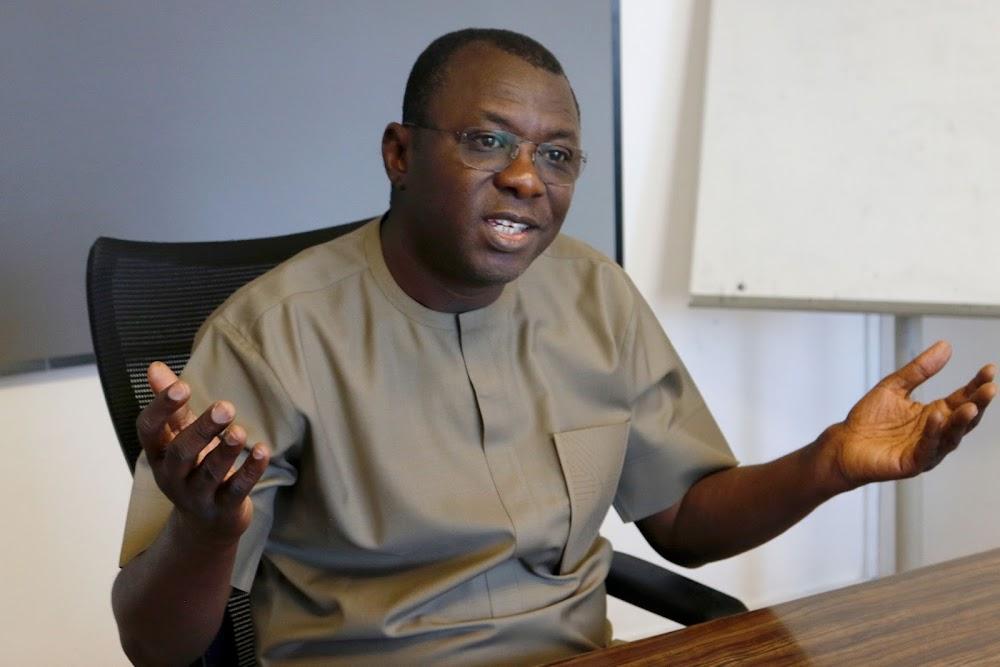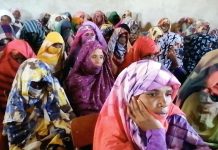Africa-Press – Eritrea. Ghanaian Finance Minister Mohammed Amin Adam on Friday said the world must ensure that Africa can borrow at reasonable rates so that it repays at a proper timeframe during his visit to Radio Africa Group Limited.
Africa is treated unfairly in the global financial markets, making it difficult for regional countries to access much needed credit to spur economic development.
In an exclusive interview with the Star Newspaper, Ghana’s Minister for Finance Dr. Mohammed Amin Adam lamented that top global credit rating agencies do not factor Africa’s vast resources into their analysis, poorly ranking counties hence higher interest rates that have condemned the continent into undending debt cycle.
“Africa has some of the biggest arable land, muneral resources and emits less carbon gases but that is not factored into credit ratings. The unfair credit rating must be relooked in order to achieve a just financial market,” Mohammed said.
His sentiment marries those of the African Economic Research Consortium (AERC) who accused major agencies like S&P, Moody’s and Fitch of being biased against Africa at the recently concluded Africa Development Bank (AfDB) annual general meeting in Nairobi.
“There is a need for a standard credit rating mechanism to address chronic low ratings by global firms, exacerbating the continent’s public debt, and threatening the sustainability and access to lines of credit,” AERC executive director Victor Murinde said.
He regretted that only two African economies are currently rated at investment-grade levels, implying high interest rates and low borrowing volumes for the continent.
The region is now pushing for a fair credit rating in the global market in a bid to ease the current debt pressure on the continent.
The Ghanaian exchequer boss noted that African countries are finding themselves burdened with interest payments eight times higher than their European counterparts and four times greater than the United States.
He noted that efforts to mitigate the impact of credit ratings have resulted in a noteworthy rise in the number of African countries subjected to evaluation by the “Big Three” credit rating agencies globally.
As of 2023, 32 countries had been assessed and given a rating, compared to only 10 in 2003.
Despite this progress, there remains a significant subjectivity in the risk perception assigned to African countries.
From January to June 2023, there were 13 ratings downgrades assigned to 11 countries.
Africa’s debt profile has surged by 183 per cent since the beginning of the new millennium, a rate nearly four times higher than its gross domestic product growth rate.
Mohammed is therefore calling on the continent to develop its own funding mechanism, warning that countries in the region will remain stagnant if it continues to rely on the current financial architect.
“Africa is not poor. Most of local funds are repatriated and invested abroad. The continent will be able to fund its own infrastructure if this trend is reversed and go big on Public Private Partnerships (PPPs),” he said.
He added that domestic revenue mobilisation through fair taxation is also an option but warned that over taxation can be counterproductive.
“The region must tax fairly by bringing more people into the tax net through well calculated incentives. Governments must ensure those taxes are spent prudently.”
The Finance Minister said that his country is paying dearly for the unfair credit rating but insisted that a due process is being followed to resolve the crisis.
“A top lesson we have learned is that international loans are not free lunches to the continent. Such resources must be the last resort for Africa and must be spent prudently with a clear repayment plan,” Mohammed said.
In April, Ghana failed to strike a deal with two bondholder groups to restructure $13 billion of international bonds, a huge blow to its efforts to swiftly emerge from default and economic crisis.
Talks were derailed for now after the International Monetary Fund (IMF) indicated that the deal would not fit its debt sustainability parameters, which set out how much debt it thinks a country can afford, the government said in a statement.
Ghana had been in formal talks with two groups holding its international bonds since March 16 – one international group of Western asset managers and hedge funds and another one including regional African banks.
The regional African bondholder group had also rejected part of the proposed rework, including an option to retain the original value of the bonds with a longer maturity and lower coupon.
In December 2022, Ghana defaulted on most of its external debt of about $30 billion as it fell into an economic crisis.
Debt costs and inflation surged, reserves dwindled and the government found itself unable to access international bond markets.
Growth in the world’s second biggest cocoa producer has since started to recover, with the Central Bank of Ghana projecting a 2.8 per cent growth this year, 10 basis points higher compared to 2023.
“The Government is actively working on solutions that it believes would be consistent with IMF programme parameters under the set of policies currently being discussed, with the objective of reaching a mutual agreement acceptable to all parties.”
The Minister who was in Kenya for the AfDB forum noted that Africa is undergoing rapid social and economic change, starting with the continent working to formalize an Africa-wide free trade agreement, which has the potential to be the largest free trade area in the world.
African nations are also actively shifting their economies away from reliance on extractable commodities toward a broader goods and services orientation which includes telecoms, media and financial services.
In order to achieve this, Mohammed said that the continent must focus on infrastructure expansion and do away with harsh protectionism policies that make it difficult for goods and services to moves between member states.
“The African Continental Free Trade Area (AfTCA) is the solution to the illusive Africa renneissnce. I’m happy with the progress so far. However, much more effort is needed to achieve this dream that will make the continent more competitive.”
Launched in 2018 with trade phasedowns commencing Jan. 1, 2021, the trade pact aims at accelerating intra-African trade and boosting Africa’s trading position in the global market by strengthening common voice and policy space in global trade negotiations.
The deal also aims to bring 30 million people out of poverty, raise the incomes of 68 million individuals and cut red tape
Prior to the AfCFTA, businesses intending to operate across the continent needed to navigate a patchwork of eight different trade pacts, including the Common Market for Eastern and Southern Africa (COMESA—21 countries), the Southern African Development Community (SADC—16 countries), and the Economic Community of West African States (ECOWAS—15 countries).
For More News And Analysis About Eritrea Follow Africa-Press







